Your First Steps Out of Debt
Debt is THE four-letter word in Personal Finance.
If you say it enough and light a candle, Dave Ramsey himself may appear to tell you it’s time to get out of it.
One of the most painful types of debt is Credit Card debt.
Remember when Mortgage Interest Rates went from 3% to 8% and everyone freaked out?
Credit card interest rates average 25%.
TWENTY-FIVE PERCENT
That means if you owe $10,000 in credit card debt, you have to spend $2,500 each year just to maintain the interest. That doesn’t even touch the debt itself.
If you’ve found yourself in credit card debt, it will be a journey to get out of it.
But, even the most daunting journeys begin with single steps.
Here Are the Exact Steps I’d Take
First, write out all of your debts
Grab ye a pen and grab ye a paper. It’s time to see and understand your situation.
Make a list as follows:
This may take some time if you have multiple credit cards and statements to go through, but will be pretty quick if you only have one.
Next, let’s see how much per month we can put towards that debt.
To do that, we need to track our current spending.
Two options:
- Credit/Debit cards will sometimes categorize spending for you on their apps
- If not, export your spending statements to Excel. From there you can:
- Manually categorize your spending into Needs and Wants
- Copy the Excel into ChatGPT for it to do it for you
Take your monthly income and subtract the average of the last three months of spending.
That’s how much money you have to put towards your debt each month if you don't change any habits.
However, your habits will need to change to get you out of credit card debt.
Some things I would do:
- Keep saving up to your 401(k) match (the match is guaranteed free money, so use it)
- Stop contributing to an IRA until you’re out of credit card debt
- Reduce your payments on student loans and other low-interest debt to the monthly minimums to maximize your credit card payments
Once you’ve identified your spending, tweak your budget where 20-30% of your take-home pay goes towards your debt. If that’s not possible, get as close as you can.
Next, Automate
Once you have a realistic number of how much you can put towards your debt each month, set recurring automatic payments to go from your checking account to your credit card.
Automating your payments prevents our irrational and emotional brain from taking over and getting into more debt.
Don’t know how to split payments between multiple cards?
If you’re motivated by quick wins, pay off the smallest balance first.
If you want to minimize the interest paid, put as much money as possible to your highest-interest debt first.
Read more about payment strategies here.
Finally, see if you can get your interest rate down
If you have a credit score below 700 you’ll likely want to call your credit card company and try to negotiate a lower interest rate. Here are some tips for that phone call and a sample script.
If you have a score above 700, you may be able to do a Balance Transfer.
Credit Card companies will sometimes offer extended periods of 0% APR on transfers from other cards.
For example:
- Say you’ve got a $10,000 balance on an AMEX Gold card with 20% APR
- Open a Discover It Cash Back Card, Chase Freedom Unlimited, or another listed here
- Transfer your $10,000 balance to the new card (This will cost you a 3-5% fee, so $300-$500).
- Now you have a $10,300 balance
- But now you have 18 months of 0% interest on that balance
- Pay $572 per month for 18 months and you’re debt free!
Sounds magical (it is pretty sweet) but make sure you get out of as much debt as possible during the 0% window. After those 12-18 months, your interest will come back.
^Everything I just wrote about is the head knowledge^
But let’s talk about the heart of credit card debt.
It’s important to understand how you got into this spot. What habits are you holding on to that you need to kill?
Do you struggle with impulse buys?
Did you put a big purchase on the card that set you back (vacation, wedding, furniture, etc.)?
If it was a one-time, large purchase that’s easier to correct.
If you struggle with habits causing credit card debt, it may be time to seek credit counseling. Getting to the "why" behind your habits can be difficult, but will be worth your time.
Like most things worth doing, getting out of credit card debt is not easy, but it is worth it.
We all have money goals and spending $1,000s each year on credit card interest is not one of those goals.
Take the first step today and write down your balances.
Good luck!


